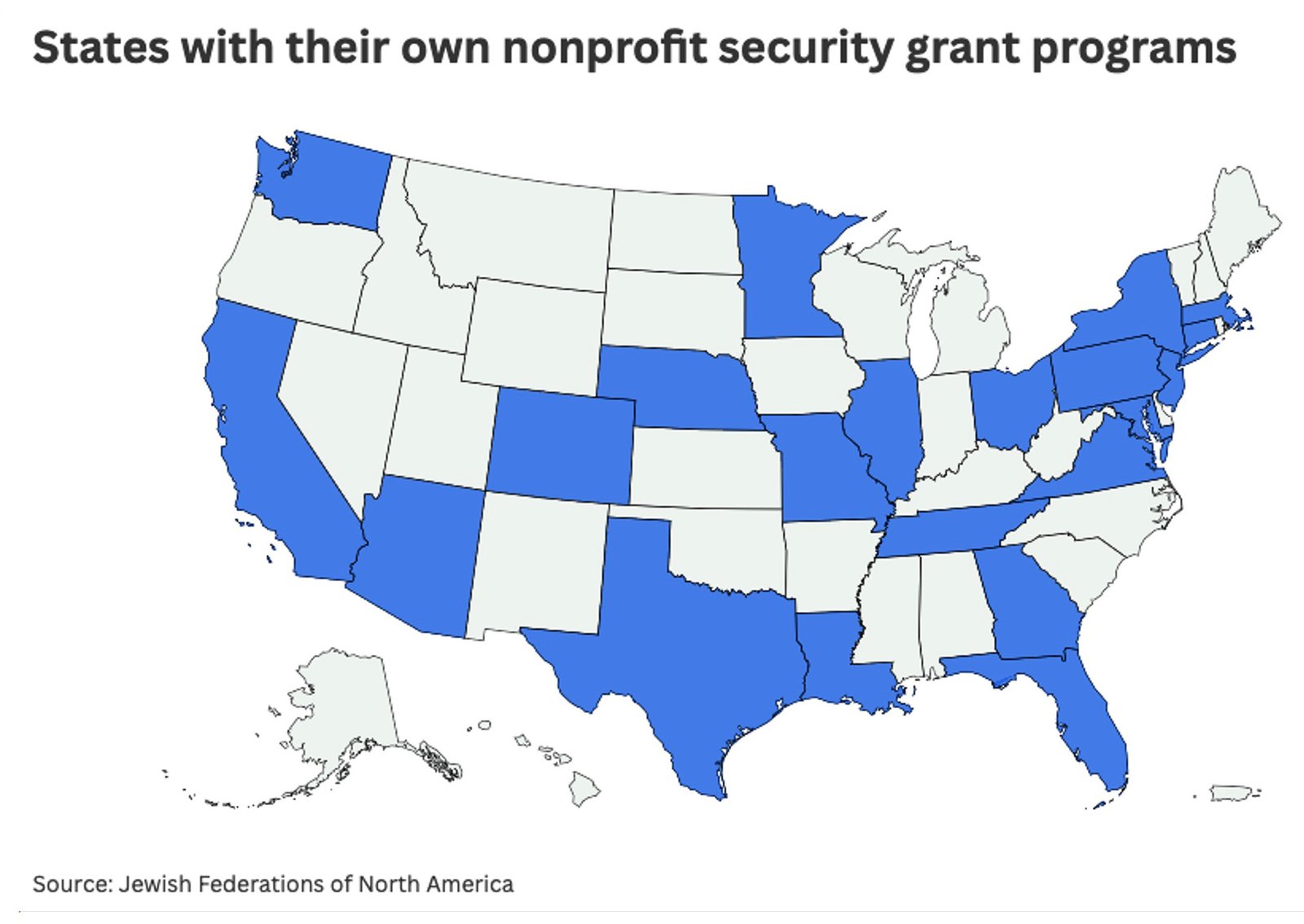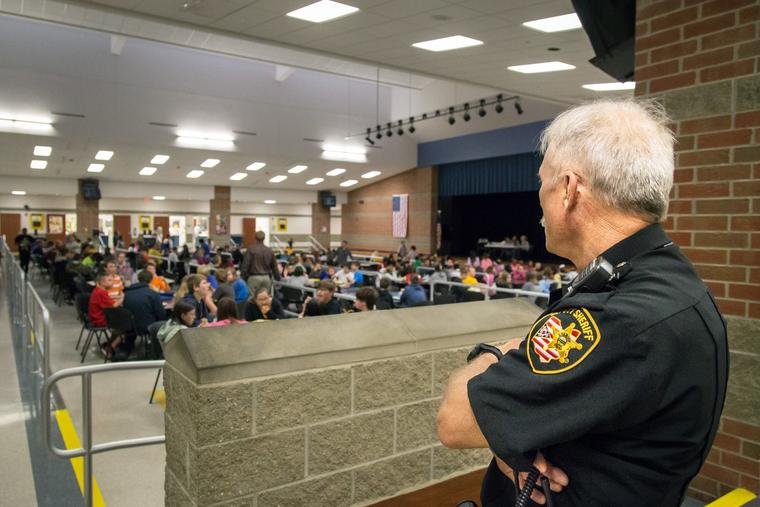The murder of two schoolchildren Aug. 27 during Mass at Assumption Catholic School in Minneapolis is prompting Catholic parishes and schools across the country to prioritize security upgrades.
But while the need for extra security staff, surveillance cameras and other measures may be readily apparent, how to pay for it is less clear.
Federal and state grants designed to help churches and other religious nonprofits improve their physical and cybersecurity have been available to Catholic parishes for decades — but those government funds often come with strings attached that may discourage Catholic parishes from applying.
The federal Nonprofit Security Grant Program (NSGP), which is set to receive around $275 million in funding this year, was created in the wake of 9/11. Houses of worship can use grant money provided by the NSGP, which is administered by the Federal Emergency Management Agency (FEMA), to set up security cameras, build fences, strengthen windows and hire security guards, among other things. Of the funds available, about half is allocated to nonprofits in urban areas deemed high-risk for extremist attacks, while the other half is allocated to nonprofits elsewhere.
Although all nonprofit organizations are eligible for funding, a large portion of the money is allocated to religious institutions — particularly religious minorities — each year.
There’s a stumbling block for many Catholic entities, however: FEMA’s terms and conditions say that recipients of the security grants must adhere to federal antidiscrimination laws, including Title IX, which protects against sex discrimination in schools receiving federal funding.
During the Biden administration, Title IX’s ban on “sex” discrimination was reinterpreted to include a ban on “gender identity” discrimination — a major issue for parishes and schools adhering to a Catholic view of gender.
This interpretation of Title IX is not currently being enforced following a January 2025 court ruling, and President Donald Trump has directed the Executive Branch to interpret Title IX in light of the reality that there are “two sexes, male and female” — an interpretation that a future administration could change.
Despite the murky Title IX situation, numerous Catholic dioceses, schools and charities have received NSGP grants in the past, the U.S. bishops say.
The Register queried the United States Conference of Catholic Bishops (USCCB) general counsel’s office for further clarification on whether NSGP grants are a good option for Catholic parishes and schools wanting to bolster their security. That office declined to comment.
Some experts the Register spoke to urged Catholic entities wanting to apply for the grants to be wary. Catholic parishes and schools have historically been cautioned against taking any kind of federal funding, because doing so triggers additional obligations which can be burdensome depending on the disposition of the federal administration.
“If funding is provided to the school, as it is with any of the FEMA programs, the school becomes a recipient of federal funding and is subject to Title IX and civil rights laws which do not all apply fully to non-recipients. This does discourage many schools from taking advantage of what might be available,” Sister Dale McDonald, vice president of public policy at the National Catholic Educational Association (NCEA), told the Register in an email.
State Programs
Nonprofits wanting to apply for the federal nonprofit security grant program can do so by contacting their relevant state administrative agency, each of which offers guidance to nonprofits through the application process.
In addition to the federal program, many states have set up their own nonprofit security grant programs, which use state funds to supplement the federal government’s dollars and provide additional security funds to nonprofits, including churches and schools.
Not every state does this — in fact, fewer than half do, according to data compiled by the Jewish Federations of North America and shared with the Register. But among those states, it’s clear that it’s an issue that transcends the “red state/blue state” divide.

In the aftermath of several devastating mass shootings in recent decades at synagogues, such as the Pittsburgh Tree of Life synagogue shooting in 2018, some of the biggest boosters of these state-level programs in recent years have been Jewish organizations. Groups such as Jewish Federations of North America and the Jewish Council for Public Affairs (JCPA) have lobbied in various states — often alongside state Catholic conferences — to get state programs created and to increase funding for existing programs.
One state with such a program is California, which announced a grant fund of $76 million for 2025 — nearly double the amount allocated in previous years — under the California State Nonprofit Security Grant Program (CSNSGP), which awards funding to at-risk nonprofit organizations, including churches, to enhance their physical and cybersecurity.
Administered by the California Governor’s Office of Emergency Services (Cal OES), the grants can be used for security measures such as reinforced doors, gates, high-intensity lighting, access control systems, and the development and enhancement of security plans and protocols. Democratic Gov. Gavin Newsom’s office says more than 1,600 organizations applied for the CSNSGP during this year’s round of funding, totaling over $325 million in requested support.
Colorado’s program, created in 2022, is set to provide in 2025 a fund totaling $1.25 million that can be used to cover the installation of security equipment on property owned or leased by the nonprofit organization, including security-related planning, exercises, training and contracted security personnel; new or existing infrastructure; or other security enhancements.
Numerous Catholic entities benefited from the Colorado grant last year, including All Souls parish in Englewood, Holy Ghost and St. Anthony of Padua parishes in Denver, and even the Denver archdiocesan headquarters, the Saint John Paul II Center for the New Evangelization. (It’s not clear from the state’s website, however, how much each grant totaled.)
In New York state, a similar program made nearly $4 million available to nonprofits this year. Florida’s state NSGP program made nearly $14.4 million available for applicants in 2025, while Nebraska’s program made $11.4 million available in 2024.
Other states with their own programs — many of which are modeled directly on the federal program and share its eligibility requirements — include Illinois, Maryland, Florida and New Jersey. Illinois’ program, for example, is specifically set up for nonprofit organizations that are at “high risk of a terrorist attack,” its website says.
In many cases, the state grants fill gaps left by the federal program. Nebraska’s program, for example, is open to nonprofits that are “unable to apply for a federal nonprofit security grant,” or which have a “documented barrier or hardship related to the application for a federal nonprofit security grant,” the state website says.
Minnesota, incidentally, is one of those 22 states with its own nonprofit security grant program, which was launched in 2017 and has been renewed every two years since, most recently in 2025.
Under Minnesota’s program, nonprofits that apply for the federal NSGP — but aren’t awarded a grant — are automatically made eligible for a pot of state money. But the security needs of nonprofits in Minnesota far exceed the funding available — a mere $250,000 per year — said Ethan Roberts, deputy executive director of the Jewish Community Relations Council of Minnesota.
Roberts also said he is “extremely sympathetic” to the Catholic community when it comes to concerns about taking public funds. He said the Jewish community in Minnesota has worked for years along with the state Catholic conference in pushing for the state to provide security funds that don’t come with problematic strings.
“We feel a tremendous sense of obligation to the Catholic community, in large part because they’ve been there for us,” Roberts said.
In part because of the lack of funding for the state NSGP program, Catholic leaders in the state have repeatedly appealed to state lawmakers for additional sources of security funding, citing increased threat levels to religious schools of all kinds.
Despite repeated pleas from the state’s bishops, Minnesota lawmakers have so far failed to act and have not extended additional state security funding to non-public schools under a number of relevant bills. In response to the Aug. 27 shootings, Democratic Gov. Tim Walz announced plans to call a special session for Minnesota lawmakers to vote on a package of gun-control measures, but he did not mention the need to provide additional security funds to churches and other nonprofits.
Success Stories
The federal nonprofit security grant program has enjoyed strong support from the U.S. Conference of Catholic Bishops for years. The bishops appealed this year to Congress to increase the program’s funding, noting that 2024’s appropriation covered fewer than half of the applicants to the program.
And despite the potential Title IX issues, several Catholic parishes have successfully received and implemented the federal security grants in recent years.
St. Jude’s Parish in Hopatcong, New Jersey, was able to fund the creation of an entire permanent security team after first receiving an NSGP grant award in Aug. 2021. So far, the parish has used more than $300,000 in security grants to install new steel emergency-exit doors at its parish center, upgrade exterior lighting, replace windows, and install video surveillance and building access control systems.
Another parish, St. Gerald Catholic Church in the suburbs of Omaha, Nebraska, applied for the NSGP grant in 2021 and was awarded more than $96,000. According to the archdiocesan newspaper, approximately $75,000 of that grant was earmarked for the purchase of equipment such as intrusion detection sensors, cameras, automatically-locking magnetic doors, swipe-card technology, and radios and headsets — the latter of which allows the parish’s parking lot security team to communicate with ushers inside the church.
Father Mark Nolte, St. Gerald’s pastor, told the Register that the parish’s leaders were inspired to apply for the grant amid parishioners and school parents expressing concerns about keeping the parish safe after some of the high-profile school shootings of the late 2010s.
As far as Father Nolte is aware, the parish has not faced any issues related to Title IX or the acceptance of federal funding. He said the main barrier they faced was simply the large amount of paperwork involved in applying for and implementing the grant.
The priest said “next on their list” in terms of security improvements is the installation of bulletproof glass — though with the federal grant money now used up, the timeline for that next project is uncertain.
Father Nolte said he is proud of what the parish was able to achieve in terms of improving its security, even if the presence of new security measures and security personnel has changed the character of the parish somewhat.
“I always tell people, ‘I’m sorry about that, but that’s the world we live in now,’” the priest said.
Whether states — or the federal government — will choose to increase funding for their nonprofit security grant programs in the wake of the recent Minnesota tragedy remains to be seen.

